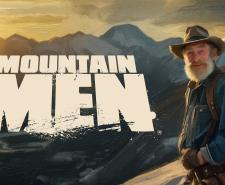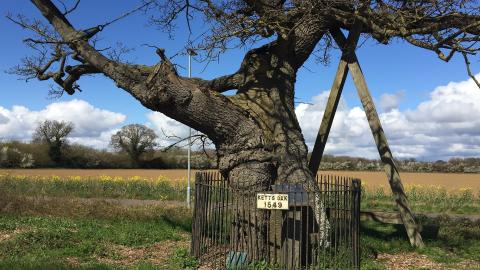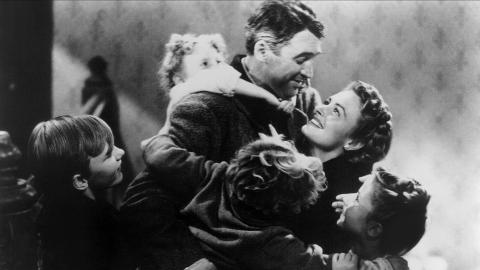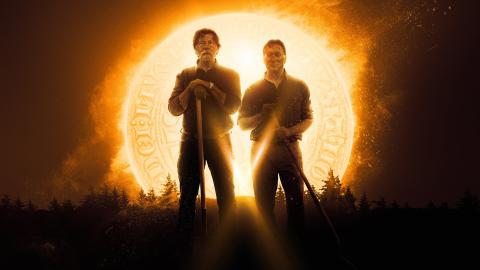
Remembering Joseph Meek: The original Mountain Man
Anyone who’s seen The Revenant will have an idea of the brutal world of the 19th Century mountain men.
Photo of Joseph Meek by Joseph Buchtel & John Chester (colourised) | Public Domain
On 20 June 1875 came the death of a man who, perhaps more than any other, embodied the gutsy, rugged pioneer spirit of the Old West. Described by one early writer as “a harum-scarum, don’t care sort of man”, he was a fighter and a survivor, a veteran of grizzly bear attacks and a teller of tall tales, and a man who eventually transformed from hard-drinking outdoors adventurer to smooth-talking politician who schmoozed with the US president. His name: Joseph Meek.
Anyone who’s seen The Revenant will have an idea of the brutal world of the 19th Century mountain men. Stanley Vestal, an author who wrote extensively on those distant and savage days, summed things up: “Mountain men were no ordinary frontiersmen, but picked adventurers who challenged the wilderness and mastered it. Those were the boys who trapped the beaver, lived on bear and buffalo, fought Indians, and caroused away their hard-earned wages.”
This was the world in which Joseph Meek came of age. Born in Virginia in 1810, his hunger for adventure led him to become a mountain man when, still a mere teenager, he joined a group of intrepid fur trappers in the Rocky Mountains. They were more akin to today’s doomsday survivalists than the cowboys of standard Wild West myth. Out amid the dense, dark forests and jagged rocky outcrops, in a time when much of the country was still an untamed wilderness, they felt a common kinship that overcame the racial and social divides that were so prevalent back in the rest of 19th Century society.
Black trappers toiled, trudged, fought and drank alongside white trappers and Native American trappers, counting on cooperation to stay sane (and alive). Ironically, this wild, rough and tumble life was only made possible by the elegant, genteel fashions of places like London, Paris and Boston, where hats crafted from beaver fur were all the rage.
As one historian, Fred Gowans, says, “It was a very, very dangerous life. They were killed by Blackfoot Indians. They were killed by grizzly bears. And maybe most devastating of all, they were killed by Mother Nature.” Death could come suddenly, with the slash of a bear’s paw or the rush of freezing river water into the lungs, or it could come slowly, through the slow spread of disease. “Those men died of fever, they died of pneumonia,” as Fred Gowans puts it. “There was a common understanding in the fur trade, if you didn't show up at the rendezvous, you were considered dead.”
It was a very, very dangerous life. They were killed by Blackfoot Indians. They were killed by grizzly bears. And maybe most devastating of all, they were killed by Mother Nature.
These “rendezvous” were annual networking and sales fairs for the trappers – a chance to recover from months in the wilderness, sell their furs, drink and make merry while reconnecting with the outside world. As one trapper recalled, a rendezvous was all about “mirth, songs, dancing, shouting, trading… yarns, frolic… with all sorts of extravagances that white men or Indians could invent.”
Joseph Meek, being a brash and gregarious type of guy, thrived during these gatherings, beginning his ascent to a figure of American folklore. He was famed for his ability to tell a story, turning his near-lethal adventures in the forests into the stuff of grown-up fairy tales.
Meek would recount his tussles with terrifying bears and his violent skirmishes with Native American warriors. Meek himself married Native women a number of times. One of his wives was called Umentucken, which meant Mountain Lamb. She was once taken captive by another tribe, causing Meek to launch a daring rescue mission in which he charged into the tribe’s camp like an “avenging spirit”, to quote an early biography.
Umentucken was herself a fierce fighter. According to one account, she got into a row with another trapper named O’Fallen, who accused her of freeing two prisoners he’d purchased from a Native tribe to use as virtual slaves. Arriving with a whip in hand to punish Umentucken, O’Fallen found himself facing the barrel of a gun.
“Coward,” she said. “You would whip the wife of Meek. He is not here to defend me, not here to kill you, but I shall do that for myself.” O’Fallen begged for his life, much to the amusement of the rest of the camp.
Umentucken was later attacked and killed by a rival tribe, and Meek would marry another Native American woman, called Virginia. Like other mountain men who defied convention by marrying Native women, he had to ignore the sneering contempt of racially sensitive urbanites of the time. But it was with her that he eventually made the transition from mountain man to settler and politician. As fashion tastes changed and the demand for fur nosedived, Meek moved out to what is modern-day Oregon. By lobbying US officials, including the US president himself, Meek played a vital role in the region becoming a US state.
In this way, his life encompassed the evolution of the modern United States itself – he was there to experience the most dangerous days of the frontier, and he was there to experience the taming of those wild lands, before passing away peacefully in 1875 to take his place among the folk heroes of that era.

















